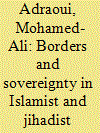| Srl | Item |
| 1 |
ID:
153872


|
|
|
|
|
| Summary/Abstract |
This article explores how Islamists and jihadists have framed issues pertaining to sovereignty, borders, as well as political and religious identity, over the last century. At a time when the territorial delimitations of several Arab countries seem more fickle than ever, it is necessary to address how Islamists and jihadists view the historical and contemporary aspects of borders and sovereignty. The Islamists, on the one hand—whose aim is creating a caliphate—have had to deal with unexpected realities, turning inevitably to some extent of reform of their original revolutionary ambition. The jihadists, on the other hand, while remaining committed to an armed struggle to unify Muslims worldwide, do not advocate for any action other than global insurrection. By focusing on the writings and discourses of major Islamist and jihadist leaders, it thus appears that the study of borders and sovereignty is indispensable to understanding the similarities and differences between the two ideologies. In addition, the study of borders and sovereignty allows for predicting developments in the region that largely pertain to the desire to achieve (jihadists) or amend (modern Islamists) the original revisionist design. It appears that borders, territory and sovereignty prove to be significant constraints for both Islamists and jihadists. Evidently, both Islamists and jihadists have reacted in diverging ways to the political and cultural realities that stand against their founding ideology—with certain Islamist movements having thus nationalized their doctrine, while jihadists still remain eager to achieve their original ambition.
|
|
|
|
|
|
|
|
|
|
|
|
|
|
|
|
| 2 |
ID:
191624


|
|
|
|
|
| Summary/Abstract |
This article focuses on contemporary Salafism in the European context and how it speaks to the categories Wiktorowicz put forth in his seminal 2006 article. Specifically, it examines how we can identify, describe, and classify the main forms of Salafist religiosity in the context of Western European countries. Furthermore, by examining the relationship to politics, preaching, and orthodoxy and orthopraxy in several European societies, this analysis contributes to the debate on the typologies of Salafism and proposes new ways of conceiving and distinguishing the forms of attachment to this vision of Islam in the context of countries where this religion is a minority. It also shows that the fundamentalist and radical currents are even more attached to it despite or because of the strong attention they receive from the public authorities and the media.
|
|
|
|
|
|
|
|
|
|
|
|
|
|
|
|